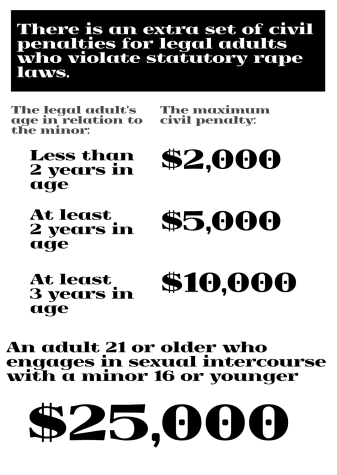Statutory rape laws exist to protect minors from sexual exploitation. However, these laws can sometimes lead to unintended consequences, particularly in situations involving consensual relationships between teenagers with minimal age gaps. Romeo and Juliet laws, also known as statutory rape exemptions, address this issue by providing legal defenses for individuals involved in such relationships. These laws recognize the complexities of teenage relationships and aim to avoid criminalizing consensual acts when both parties are close in age.
This article will delve into the intricacies of Romeo and Juliet laws, exploring their purpose, application, and variations across different jurisdictions. We’ll examine the concept of statutory rape exemptions, the factors considered when determining age gaps and consent, and the legal defenses available under these laws.
What are Romeo and Juliet Laws?
Romeo and Juliet laws are legal provisions that offer a defense against statutory rape charges in cases where the sexual relationship involves minors with a relatively small age difference and both parties are considered to be of a certain minimum age. These laws acknowledge that teenagers may engage in consensual relationships that fall within a narrow age range and aim to prevent the criminalization of such acts when both individuals are close in age and consenting.
The rationale behind Romeo and Juliet laws is to distinguish between genuine consensual relationships and situations involving abuse or exploitation. By recognizing the complexities of teenage relationships, these laws seek to avoid overly harsh penalties for individuals who engage in consensual sexual activity with a minor who is close in age.
It’s important to note that Romeo and Juliet laws do not condone or encourage sexual activity between minors. They are designed to provide a legal defense in specific circumstances where the age difference is minimal and both parties are considered to be of a certain maturity level.
Statutory Rape Exemptions

Statutory rape exemptions, often referred to as Romeo and Juliet laws, are exceptions to the general statutory rape laws that apply in most jurisdictions. These exemptions recognize that there are situations where a sexual relationship between minors may be consensual and not constitute sexual abuse.
The specific criteria for statutory rape exemptions vary from state to state. However, they generally involve a narrow age gap between the individuals involved, typically within a few years. Additionally, both parties must be of a certain minimum age, which is often set at 16 or 17.
For example, in some states, a 17-year-old may be able to claim a Romeo and Juliet law defense if they engage in a sexual relationship with a 15-year-old. However, if the age difference is greater, or if one of the individuals is significantly younger, the Romeo and Juliet law defense may not be available.
Age Gaps and Consent
The age gap between the individuals involved in a sexual relationship is a crucial factor in determining whether Romeo and Juliet laws apply. These laws typically only apply when the age difference is relatively small, often within a few years.
The concept of consent is also paramount. While Romeo and Juliet laws recognize that teenagers may engage in consensual relationships, it’s important to note that consent must be freely and voluntarily given.
Factors such as coercion, manipulation, or power imbalances can negate consent, even in situations where the age gap is minimal. Courts will carefully consider all relevant circumstances to determine whether consent was genuine and freely given.
Minimum Age Requirements
Most jurisdictions that have Romeo and Juliet laws also establish a minimum age requirement for both parties involved in a sexual relationship. This minimum age is typically set at 16 or 17.
The rationale behind the minimum age requirement is to ensure that both individuals involved in the relationship are considered to be of a certain maturity level and capable of understanding the nature and consequences of their actions.
Legal Defenses

When facing statutory rape charges, individuals may be able to utilize Romeo and Juliet law defenses if they meet the specific criteria outlined by their jurisdiction. These defenses aim to demonstrate that the sexual relationship was consensual and did not involve abuse or exploitation.
To successfully claim a Romeo and Juliet law defense, individuals must typically prove that:
- The age difference between the parties was minimal, typically within a few years.
- Both parties were of a certain minimum age, often 16 or 17.
- The sexual relationship was consensual, meaning both parties freely and voluntarily agreed to engage in sexual activity.
Romeo and Juliet Law Variations
It’s important to note that Romeo and Juliet laws vary significantly from state to state. Some states have comprehensive Romeo and Juliet laws that provide broad exemptions from statutory rape charges, while others have more limited exemptions.
Some states may have specific age limits or other criteria that must be met to qualify for a Romeo and Juliet law defense. It’s crucial for individuals facing statutory rape charges to consult with an attorney who is familiar with the specific laws in their jurisdiction.
Conclusion
Romeo and Juliet laws provide a nuanced approach to statutory rape laws, recognizing the complexities of teenage relationships and aiming to avoid criminalizing consensual acts between minors with minimal age gaps. These laws are designed to protect both teenagers and the integrity of the legal system by distinguishing between genuine consensual relationships and situations involving abuse or exploitation. However, it’s essential to understand that Romeo and Juliet laws are not a blanket exemption from statutory rape charges and vary significantly from state to state. Individuals facing such charges should always seek legal counsel to understand their rights and potential defenses.



